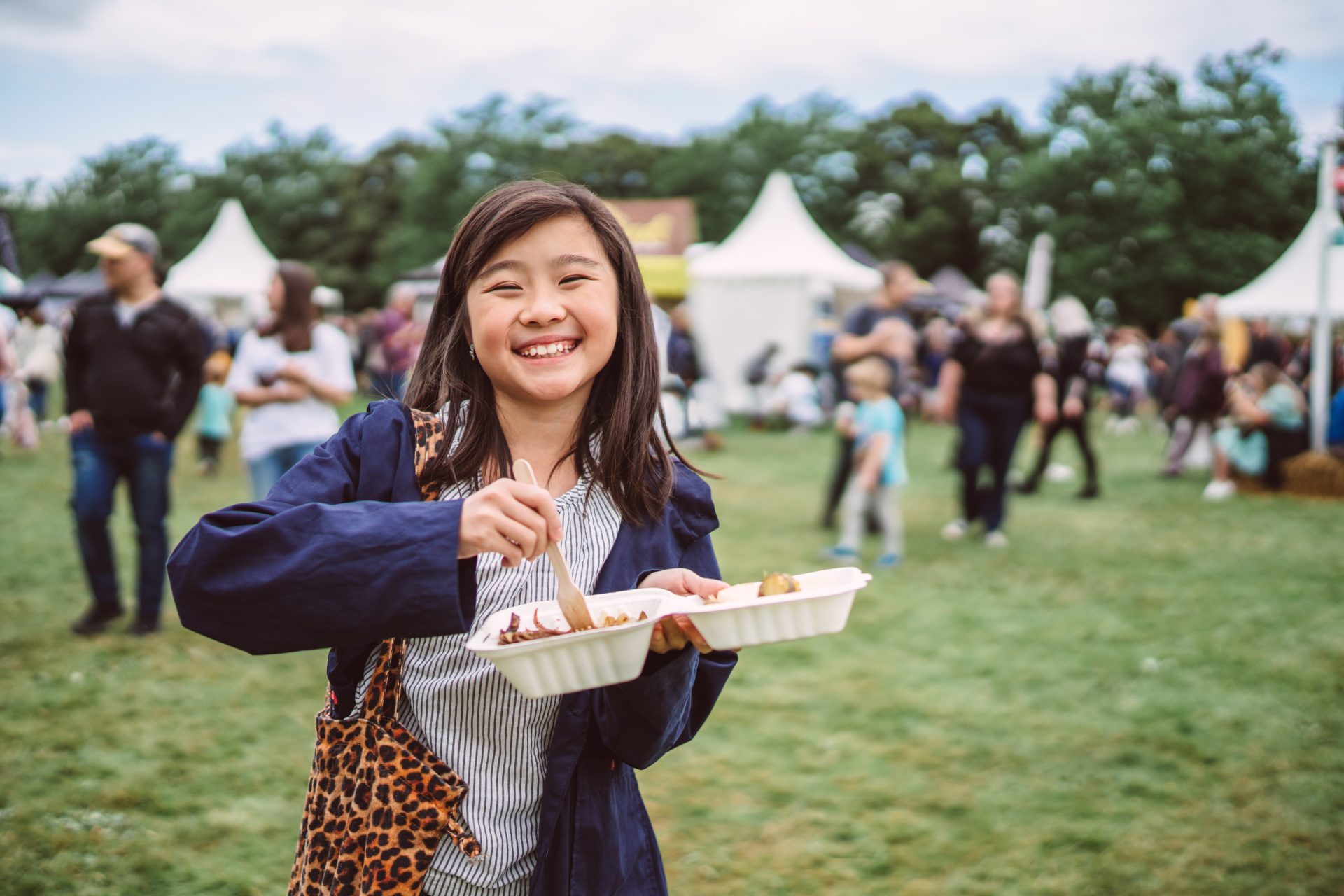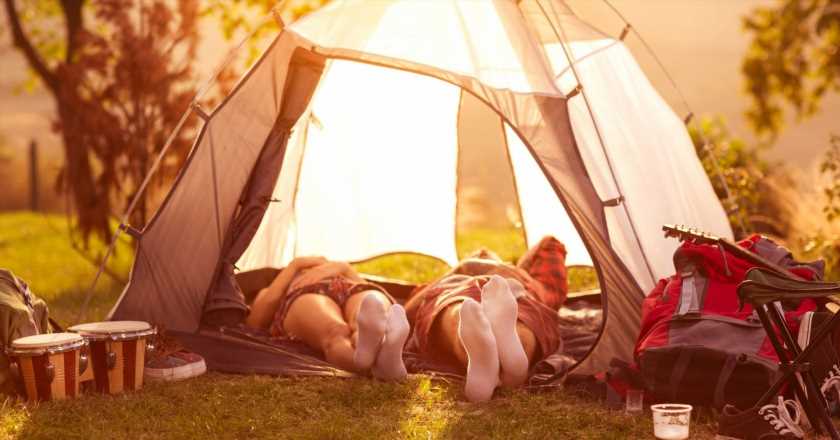Heading to Glasto this week? Got Latitude lined up next month? Whatever festival you’re headed to this year, you’ll need this handy guide to catching 40 winks.
After two long summers of lockdowns and uncertainty, festival season is well and truly back in action. In fact, it’s believed that more than 5 million Brits will be heading towards the country’s numerous and eclectic live gigs over the next few months – many of which include overnight stays in campsites.
Festival fun kicks off this week with the world-famous Glastonbury Festival, which will see some 200,000 people descending on Worthy Farm to watch headliners Billie Eilish, Paul McCartney and Kendrick Lamar grace the main stages, alongside hundreds of legendary DJs, performers and artists across the festival’s numerous stages.
But almost as legendary as Glastonbury’s very own Pyramid Stage are the festival’s numerous campsites, with the more hardcore thrill-seekers staying on Worthy Farm for as many as six nights.
You may also like
Why 7 hours of sleep is what we should be aiming for, according to new Cambridge University research
You don’t need to have been to a festival to know that once the live acts finish for the evening, the party continues long into the night, with late-night DJs, club sessions and dancing going on well into the small hours. And unsurprisingly, several late nights on the trot at a festival can take its toll on our usual sleeping patterns.
“When you’re up late dancing or doing some sort of exercise, it keeps your senses aroused and alert,” sleep therapist Dr Lindsay Browning tells Stylist. “It’s going to take a little while for your body to come down from the highs of dancing and the party atmosphere before you fall asleep.”
Alcohol also has a significant impact on our ability to get a good night’s sleep after a festival. Booze affects your ability to get crucial REM (rapid eye movement) sleep, the specific sort of Zs you need for your body to recover for the day ahead.

“Alcohol is a sedative and it’s more likely to help you to fall asleep quickly, or rather pass out,” Dr Browning says. “However, the quality of that sleep is really disrupted, and as you move towards each sleep cycle, you’ll find yourself waking up more than usual.”
And of course, heading back to a lumpy sleeping bag in a cramped tent alongside many of your pals will not make for a comfortable journey to the land of nod.
“Being uncomfortable is likely to make you wake up more frequently, but also when you do wake up, you’ll realise you’re uncomfortable and then it’ll be harder to get back to sleep again,” Dr Browning continues. “And then you’ve also got the problems with sound and light in a tent. Being in a field is a really noisy environment, with cows and birds, and then at a festival, you’ve also going to have 24 hours a day talking, partying, doing things in the other tents around you.
“If you’ve gone to bed late at a summer festival, you also have to remember the sun will rise sometimes as early as 5am, which may disrupt your sleep, particularly if you only went to bed at 2am.”
Very little sleep is better than no sleep at all
Just one night of poor sleep can have a significant impact on our wellbeing, with even our choices the next day impinging on how much shut-eye we get. We’re more likely to catch colds, choose less nutritious food and have slower reaction times after a disturbed sleep.
But, Dr Browning says: “Very little sleep is better for us than no sleep at all. Even small amounts of snatched sleep in your tent throughout the day is better than staying up all night and trying to power through.”
However, it doesn’t necessarily mean that everyone who attends festivals that feature multiple days of camping devolves into a sleep-deprived zombie – in fact, the accumulative lack of sleep can actually help with some of the discomfort that accompanies a festival.
“We all have something called a homeostatic sleep drive, which is effectively your hunger for sleep,” Dr Browning says. “When you become cumulatively more sleep deprived, you might actually find yourself sleeping better in the latter half of the festival; your need for sleep is so great it manages to help you sleep despite all the noise, light and other distractions.”
How to sleep well at a festival
There are other ways to ensure that whatever sleep you do manage to snatch is of reasonable quality, according to Dr Browning.
Drink plenty of water and coffee
“Keeping hydrated is really important. If you want help through the day after a night of horrendous sleep, caffeine is absolutely your friend. Morning caffeine will give you a boost, help you to wake up and help you power through the day.
Get outside your tent as soon as you wake up
“Festivals thankfully tend to be outdoors, and sun exposure during the day helps you to feel more alert and awake. Being up and about in the fresh air at a festival would be better for you than if you had been up all-night partying and then you just stayed in all day.”
Try to eat something nutritious
While it may be tempting to load up on burgers, fries or any general junk food to ease a hangover or help with tiredness, there are far healthier choices that can help you prepare for a better night’s sleep.

“Foods that are good at helping us sleep are those that are rich in tryptophan, which is what our body uses to make melatonin, our sleep-promoting hormone,” Dr Browning says. “Nuts, seeds, white meats such as chicken and turkey, and oily fish are all packed full with this.
“An ideal dish to grab from a food stall would be something like satay chicken or falafel with chickpeas if you’re a vegetarian. To keep you feeling awake the next day, you need foods that slowly release energy throughout the day: effectively complex carbs such as rolled oats, brown bread and brown rice. That may be harder to find from a festival stall, however.”
Bring essential supplies
Dealing with discomfort from your sleeping arrangement can be fairly easily remedied by shelling out for a few additional items. Dr Browning says that ear plugs and eye masks are “essential”, and recommends going for a silk eye mask that’s softer on your skin and more bacteria-resistant.
How to recover from a festival
When the halcyon days of the festival draw to a close, catching up on sleep is something many of us are keen to do. But you can’t really treat sleep like an overdrawn bank account, Dr Browning warns.
“You can’t overdraw sleep and put the money back in again. You can’t make up for it like that, but you can rebuild in such a way that you’re OK again. The best thing to do when you’ve returned from your festival is to move your bedtimes and wake-up times a bit earlier. Napping through the day also helps, but don’t overdo it as it will mean you’ll struggle to sleep at night.”
Wellness expert Aysha Bell, who is well acquainted with the lethargy of festivals, adds that some calming, meditative exercises may be of help: “Post-festival yoga and meditations can calm the body,” she says. “Good healthy food, movies and friends are amazing remedies for a good recovery. Be kind to yourself: sleep, eat, repeat. And if you can, clear your diary for the day after you return. There’s nothing worse than going home and straight to work unrested if it can be avoided.”
Dr Browning is keen to stress that while your quality of sleep is bound to be affected at a festival, it isn’t something festivalgoers should spend too long fretting about.
“Human bodies are designed to adapt to periods of sleep deprivation. That’s why we are able to cope with babies,’ she says. ‘If you were staying up five nights every week, that would have a significant long-term impact on your wellbeing.
“But going to Glastonbury once a year isn’t something we need to stress about.”
Images: Getty
Source: Read Full Article
